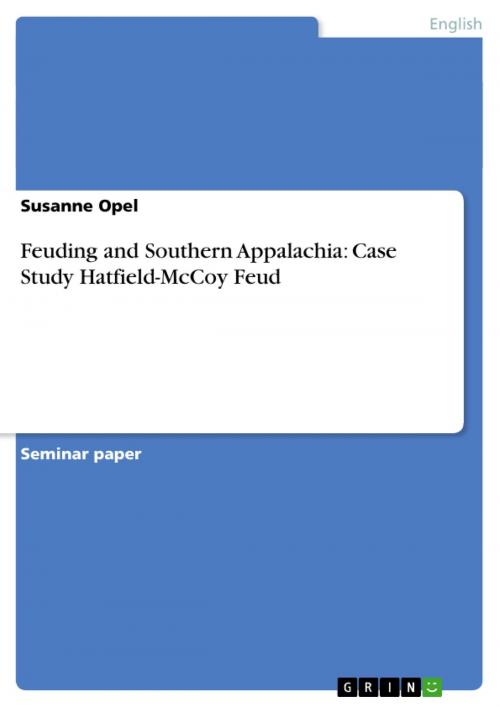Feuding and Southern Appalachia: Case Study Hatfield-McCoy Feud
Nonfiction, Entertainment, Drama, Anthologies| Author: | Susanne Opel | ISBN: | 9783638406055 |
| Publisher: | GRIN Publishing | Publication: | August 5, 2005 |
| Imprint: | GRIN Publishing | Language: | English |
| Author: | Susanne Opel |
| ISBN: | 9783638406055 |
| Publisher: | GRIN Publishing |
| Publication: | August 5, 2005 |
| Imprint: | GRIN Publishing |
| Language: | English |
Seminar paper from the year 2003 in the subject American Studies - Culture and Applied Geography, grade: 2, University of Rostock, 8 entries in the bibliography, language: English, abstract: The American South is generally known for its hot climates, its cotton and tobacco fields and its slave-holding history. However, for the region of Southern Appalachia, it is a different story. Life in the mountains was quite different from our picture of the South. The people lived on small farms, miles away from each other and owned only little land on which they worked with their whole family and some helpers but normally without slaves. Since the mountaineers lived so isolated they developed their own traditions and sets of values and became distinct from the ordinary Southerner. Of course that constructed stereotypes. The Appalachian mountaineer, or 'hillbilly' is seen as illiterate, dumb, naïve, slow, ugly, dirty, lazy, drunken, violent and all in all 'weird'. Also, the role of the family is important: mountaineers are said to have dozens of children and a whole community of hundreds of people may bear only three different surnames. Thus, kin is important in the mountains and family loyalty may be essential. On grounds of these and other stereotypes and several incidents, happening mainly at the end of the 19th century, a myth about mountain feuding emerged. According to the media of those times and countless stories and legends developing from them, mountaineers start to quarrel about some non-important things and this produces a conflict between their families, which lasts over decades. As Mark Twain, one of the best known writers on mountain feuding lets Buck Grangerford, a character in his novel The adventures of Huckleberry Finn, say: '[...] a feud is this way. A man has a quarrel with another man, and kills him; then that other man´s brother kills him; then the other brothers, on both sides, goes for one another; then the cousins chip in - and by-and-by everybody´s killed off, and there ain´t no more feud. But it´s kind of slow, and takes a long time.'
Seminar paper from the year 2003 in the subject American Studies - Culture and Applied Geography, grade: 2, University of Rostock, 8 entries in the bibliography, language: English, abstract: The American South is generally known for its hot climates, its cotton and tobacco fields and its slave-holding history. However, for the region of Southern Appalachia, it is a different story. Life in the mountains was quite different from our picture of the South. The people lived on small farms, miles away from each other and owned only little land on which they worked with their whole family and some helpers but normally without slaves. Since the mountaineers lived so isolated they developed their own traditions and sets of values and became distinct from the ordinary Southerner. Of course that constructed stereotypes. The Appalachian mountaineer, or 'hillbilly' is seen as illiterate, dumb, naïve, slow, ugly, dirty, lazy, drunken, violent and all in all 'weird'. Also, the role of the family is important: mountaineers are said to have dozens of children and a whole community of hundreds of people may bear only three different surnames. Thus, kin is important in the mountains and family loyalty may be essential. On grounds of these and other stereotypes and several incidents, happening mainly at the end of the 19th century, a myth about mountain feuding emerged. According to the media of those times and countless stories and legends developing from them, mountaineers start to quarrel about some non-important things and this produces a conflict between their families, which lasts over decades. As Mark Twain, one of the best known writers on mountain feuding lets Buck Grangerford, a character in his novel The adventures of Huckleberry Finn, say: '[...] a feud is this way. A man has a quarrel with another man, and kills him; then that other man´s brother kills him; then the other brothers, on both sides, goes for one another; then the cousins chip in - and by-and-by everybody´s killed off, and there ain´t no more feud. But it´s kind of slow, and takes a long time.'















